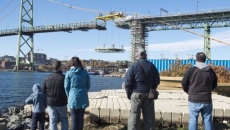"We might need to do additional management actions if our goal is to conserve caribou," said Melanie Dickie, lead author of a new paper in the journal Global Change Biology.
For years, biologists have pointed to sustained industry-caused damage to the old-growth forests preferred by caribou as the reason the species is now threatened. Many argue that the cutlines and clearcuts left behind are pathways for deer, which lure along packs of wolves that end up preying on caribou as well.
But climate change has also been at work in the forests. Slowly warming temperatures have greatly expanded the range in which whitetail deer can thrive.
"Climate is spreading the envelope of where deer can establish themselves," said Dickie, senior caribou ecologist for the Alberta Biodiversity Monitoring Institute.
In the late 1990s, whitetails were scarce in the northern boreal, Dickie said. By the turn of the century, they were abundant.
In order to establish whether that envelope was spread by climate or by habitat, the authors looked to a region of northeastern Alberta and northwestern Saskatchewan.
On the Alberta side of the boundary, industrial disturbance was almost four times greater than in Saskatchewan. Meanwhile, the region was large enough that its northern end was significantly colder and snowier than its southern.
Using an extensive network of camera traps that captured tens of thousands of images of whitetail deer, the researchers concluded that the north-south temperature gradient made a much larger difference to deer density than the east-west differences in human disturbance.
"We found far fewer deer in places where the climate was snowier and colder," Dickie said. "We did not find an effect (from) habitat alteration -- it was half the magnitude of the climate impact.
"It was surprising the signal was so clear. Overwhelmingly, it was climate."
Although human impacts on caribou range are much heavier in western Alberta -- some ranges are more than 90 per cent disturbed -- Dickie said she would expect similar results for that region as her paper found in the east.
"Habitat alteration might indeed provide more food for deer. But if the climate is such that they can't make it through the winter, then it's going to be climate that sets the envelope."
The consequences for caribou conservation could be profound.
Efforts to keep the species on the landscape focus on remediating disturbed habitat. The Alberta government alone has spent more than $49 million on such efforts.
If Dickie's paper is correct, no amount of tree-planting and cutline remediation will be enough.
"It might not, on its own, reduce deer densities sufficiently to reduce wolf densities," she said.
Tough choices are on their way.
"Perhaps we prioritize the northern populations and give caribou a safe haven in the north," Dickie said. "Places where we have deer established, we might need to do additional management."
That means killing more wolves, Dickie acknowledged. Hunting more deer might help, too.
"There are some real social, economic and ethical considerations for all of these various management options," she said.
Dickie maintains caribou can have a future in the boreal forest and that her findings aren't a reason to stop trying to repair industrial impacts.
"There are a litany of reasons to do restoration and caribou aren't the only species on the landscape. I think it behooves society to undo the disturbances we've created."





